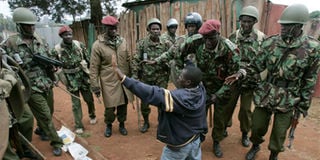Tough new rules seek to curb police brutality

A man begs for mercy from anti-riot policemen during protests in the Nairobi's Kibera slum in this file photo. Photo/FILE
Police are bracing for a new order in the way they conduct security operations because there are new regulations targeting rogue officers who either torture or kill suspects.
The 72-page draft containing the regulations was presented to senior police officers last week and faced with the strictness of its proposals, they appealed for time to study and understand it before its implementation.
Is is drafted by the new Independent Policing Oversight Authority (IPOA) and radically changes the way officers would be held accountable for their actions, a departure from the past when complaints against an officer was investigated by the police themselves.
Key among the regulations is that police commanders who issue unlawful orders to their juniors resulting to death or injury of suspects face criminal prosecutions besides other disciplinary actions like sack and demotions.
IPOA chairman Macharia Njeru said the police have two weeks to study the document and give their thoughts, including proposing amendments.
“After meeting senior police officers to discuss the regulations, we decided to give them more time as they requested. These are just part of the reforms in the security sector,” he said.
Other radical proposals aimed at preventing extra judicial killings will also see police officers not only liable for causing death directly, but for failing to protect suspects in their custody from being harmed or killed by other people.
Such a case would arise in the event a person is detention is beaten to death by fellow inmates, according to the new regulations seen by the Sunday Nation.
IPOA also presented the document to civil society organisations involved in security matters on Wednesday.
During the session, Mr Njeru revealed that the civilian oversight Authority would draw a Memorandum of Understanding with the office of the director of public prosecutions so that court cases which police are alleged to have fabricated are withdrawn.
“We are aware that officers sometimes bring up trumped up charges to avoid doing investigations. We will draw an MOU with the DPP. Thereafter we will simply be writing to the DPP to withdraw charges so that we can investigate claims against officers. If we find out that the police were trying to circumvent the investigations we will recommend the officer be charged. And if the police were correct, then the case would go back to court,” he said.




